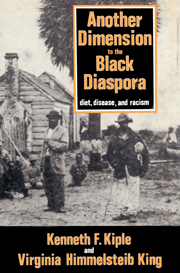13 - Epilogue: Cradle to grave
Published online by Cambridge University Press: 26 March 2010
Summary
Perhaps the greatest need of the Negroes, in the way of reducing sickness and death, is for the dissemination of knowledge on how to take care of the body in both its normal and its pathological state.
Gunnar Myrdal (1944)All the Negroes I've seen around here are so fat they shine!
Mississippi Governor Paul Johnson in response to a question about hunger among blacks in his state (1967)President Truman's classic comment on politics, “If you can't stand the heat, stay out of the kitchen,” has been stood on its head by officials reacting to heat on the hunger issues. They simply try to destroy the stove or oven responsible for the heat.
John Kramer (1974)The dawn of the twentieth century saw the black death rate standing at 30.2 per 1,000 as opposed to a white rate of 17.3. Seven decades later (1972) the black death rate had been reduced to 9.4 per 1,000 and the white to 9.3 per l,000. Superficially it would seem that national selfcongratulation is in order. Not only has the black death rate been cut by two-thirds, but today it is virtually the same as the white. Tuberculosis, which was killing turn-of-the century blacks at a rate well over 450 per 100,000 (three times the white rate), had by the years 1929–31 declined substantially in virulence removing only 199 for every 100,000 live population (yet still selecting blacks over whites at a 3:1 rate). Today the disease kills a mere 8 blacks per 100,000 population, although parenthetically the racial preference of the disease has increased. As of 1972 the black tuberculosis mortality rate was almost five times that of whites.
- Type
- Chapter
- Information
- Another Dimension to the Black DiasporaDiet, Disease and Racism, pp. 191 - 207Publisher: Cambridge University PressPrint publication year: 1981



